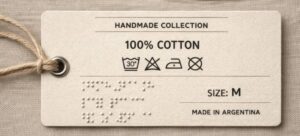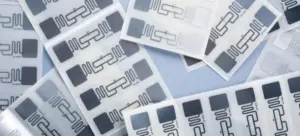Sustainability is no longer just a trend — it’s a demand from the market, from consumers, and from the planet. The fashion industry, one of the most influential in the world but also one of the most polluting, is undergoing a major transformation toward more responsible practices. While the spotlight often falls on organic fabrics or ethical production, there’s one element that frequently goes unnoticed, yet is an essential part of every garment: the label.
At Indet, we’ve been designing and producing labels for fashion, sports, outdoor, and lifestyle brands around the world for over three decades. We know firsthand the power of a label — not just as a brand identifier or functional component, but as a carrier of values. And one of those values — more relevant today than ever — is sustainability. That’s why we believe that even a detail as small as the ink used to print a label can make a real difference.
Why inks matter
It might seem like a technical detail — almost invisible — but the inks used in printing have a direct impact on the environment and on human health. Many conventional inks contain chemical solvents, heavy metals, or volatile organic compounds (VOCs), which can release toxic emissions, pollute water during production, and even cause skin irritation when in direct contact.
Eco-friendly inks, on the other hand, are designed to minimize these risks. They’re made with low-impact ingredients, free from hazardous substances, and involve cleaner production processes. Choosing this type of ink isn’t just a technical or aesthetic decision — it’s an action that has real consequences for the sustainability of the final product.
What makes an ink eco-friendly?
Not all “green” inks are truly sustainable. That’s why it’s important to look for key characteristics that define a genuinely eco-friendly ink:
- Water- or plant-based: Unlike conventional inks that use petroleum-derived solvents, eco-friendly inks are made with water or vegetable oils as their base. This significantly reduces the emission of volatile organic compounds (VOCs) and creates safer working conditions in printing facilities.
- Free from heavy metals and toxins: Many industrial inks contain harmful elements like lead, cadmium, or mercury. Eco-friendly inks are formulated without these substances, making them safer for both the environment and human health.
- Biodegradable and easy to recycle: A good eco-ink is designed to work within recycling or composting processes without leaving behind toxic residues. This is especially important when printing on materials like recycled cardboard or kraft paper.
- International certifications: Labels such as OEKO-TEX®, GOTS (Global Organic Textile Standard), or Bluesign® ensure that the ink meets rigorous standards for sustainability, safety, and traceability.
Sustainable fashion: consistency in every detail
When a brand defines itself as sustainable, consumers expect consistency throughout the entire process — from fabrics to packaging, and of course, labels. It’s not enough to use organic cotton if the label is printed with polluting inks or on non-recyclable materials.
The label, though small, is often the first thing a customer sees — the first point of contact with the product. That’s why it should align with the values that the garment represents. In the world of conscious fashion, every choice matters, and brands that pay attention to every detail — from design to responsible printing — communicate authenticity and true commitment.
The benefits of eco-friendly inks on labels
Beyond their environmental impact, using eco-friendly inks on labels offers tangible benefits for brands, manufacturers, and consumers:
- Greater safety for the end user: For inner labels that come into direct contact with the skin — such as those on sportswear, underwear, or children’s clothing — the use of non-toxic inks helps reduce the risk of allergies, irritation, and skin reactions.
- Reduced product environmental footprint: By using inks that don’t produce hazardous waste or emit toxic substances, the printing process has a much lower impact on water, air, and soil.
- Improved brand perception: Brands that commit to sustainable practices in every part of their product build stronger reputations, foster customer loyalty, and stand out from the competition.
- Compatibility with sustainable materials: Eco-friendly inks work seamlessly with recycled paper, FSC®-certified cardboard, organic cotton fabrics, and compostable materials — making it easier to create a 100% sustainable label.
Genuine commitment or greenwashing?
In a market where more and more brands are jumping on the sustainability bandwagon, it’s easy to fall into greenwashing — appearing sustainable without truly being so. But today’s consumers aren’t satisfied with feel-good messages; they want facts, proof, and consistency.
Using certified eco-friendly inks and communicating it transparently is an effective way to reinforce a sustainable brand’s credibility. It’s not just about protecting the planet — it’s about building trust with increasingly informed and demanding customers.
At Indet, we help brands not only produce responsible labels, but also tell the story behind them: what materials they use, why they’ve chosen eco-friendly inks, and what impact those decisions have. Because sustainability is also about communication.
Sustainability isn’t achieved through grand gestures alone. It’s built through small, thoughtful choices — like selecting the right ink for a label. At Indet, we believe that every decision, no matter how small it may seem, makes a difference.



